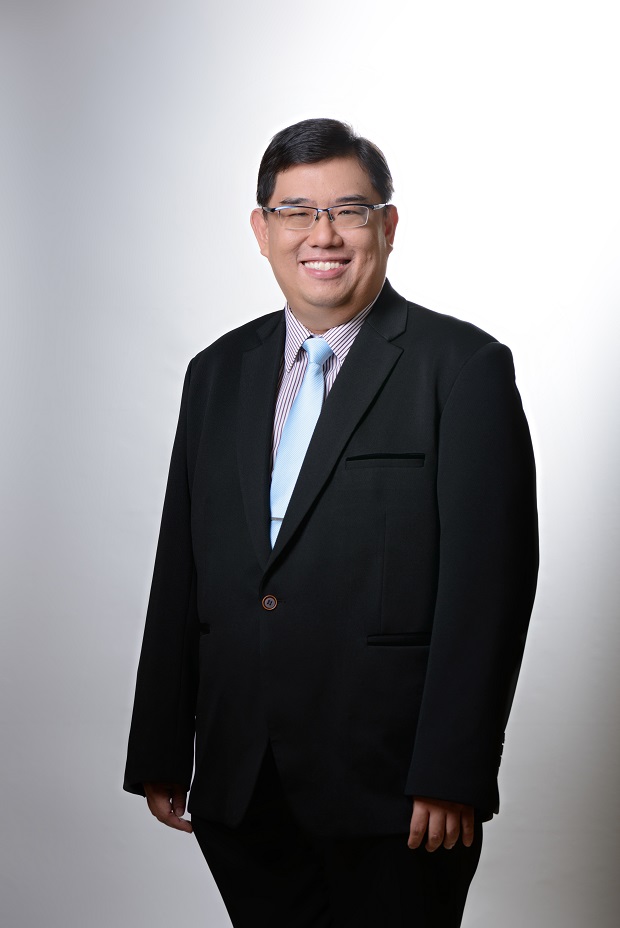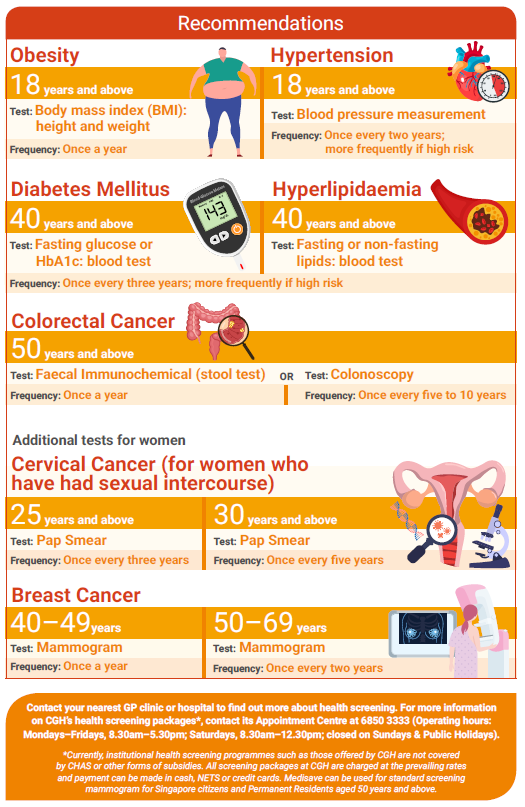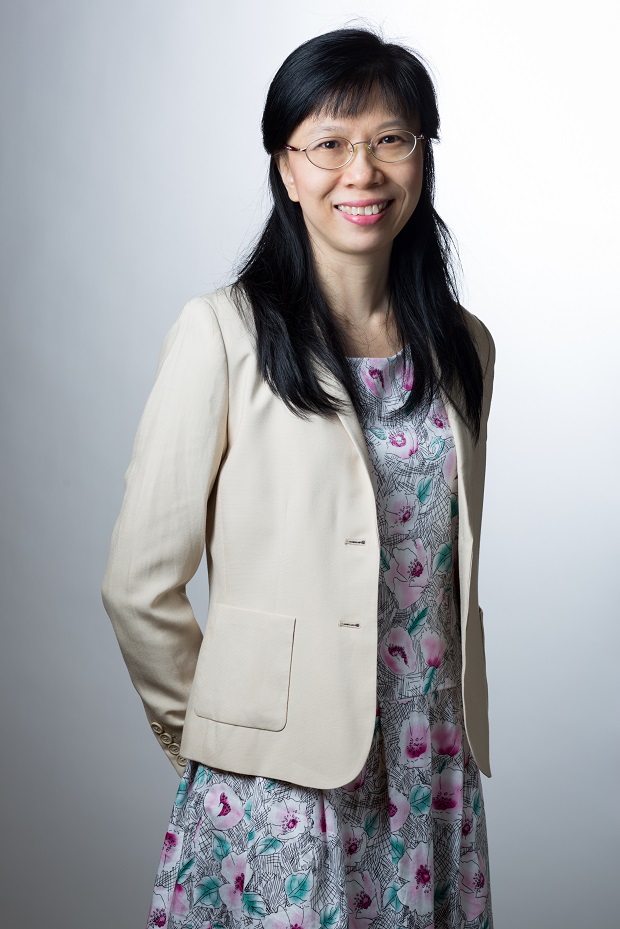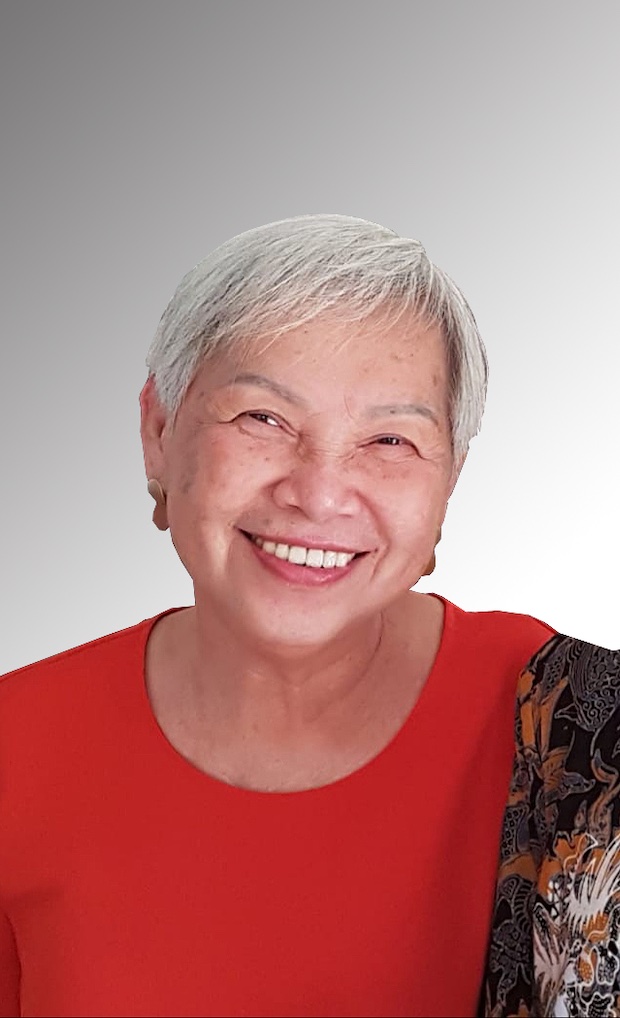Today’s modern lifestyle predisposes people to chronic illnesses such as diabetes, hypertension and high cholesterol. Many of these diseases can be detected early through health screening, and then addressed to prevent complications such as heart disease, stroke and kidney failure.
Health screening uses tests and examinations to detect diseases early in people who look or feel well. It is different from diagnostic tests, which are done when someone is already showing signs of a disease.
There are two broad categories of screening tests, says Clinical Assistant Professor Christopher Chang (below), Senior Consultant, Department of Care and Health Integration, Changi General Hospital (CGH).

Category 1 screening tests are beneficial for everyone. Doctors assess an individual based on their medical history and lifestyle to identify potential risks. They include:
• Physical examinations to assess blood pressure and body mass index
• Blood glucose tests to check for diabetes
• Blood cholesterol tests to check for high cholesterol and risk of cardiovascular conditions
• A colonoscopy or testing a stool sample for the presence of small amounts of blood in the faeces to screen for colorectal cancer among individuals aged 50 years and above
• Pap smear or human papillomavirus tests for women aged 25 to 69 years who have had sexual intercourse to screen for cervical cancer
• Mammograms for women aged 40 years and above to screen for breast cancer
Category 2 screening tests are beneficial for some and the decision for such screenings is made on an individual basis depending on the person’s risk profile such as smoking. They include:
• Liver cancer screening for Hepatitis B carriers
• Bone Mineral Density scans for individuals with high osteoporosis risk
• Hearing tests for individuals who have been exposed to excessive noise
Read more: Going for a health screening or planning one? Get useful tips here!
All bases covered
Under the Screen for Life – National Health Screening Programme covered under the Community Health Assist Scheme (CHAS), participating CHAS General Practitioner clinics conduct only Category 1 screening tests.
At CGH, screening packages for both categories are offered. CGH’s screening programme also includes a risk assessment by its doctors to determine what Category 2 screening tests are required or appropriate for individuals.
Screening at CGH is conducted over two outpatient visits. On the first visit, doctors assess the person’s medical conditions, risk factors for various diseases and current health status. The doctor will also advise which screening package is more suitable for that person. Depending on the screening package selected, the tests will take two to four hours to complete.
The second visit takes place one to two weeks later. During this session, a medical report on the test results and overall health status will be shared, followed by lifestyle counselling on how to improve or maintain good health. If necessary, doctors will refer the person to specialists for further evaluation and management.
“Early treatment and good control of your condition can result in better outcomes and prevent or delay serious complications. If the screening tests are normal, it is important to recognise that a one-off screening can only pick up health conditions that are present at the time of screening. It is thus vital to continue with regular screening tests at the recommended frequency,” Clin Asst Prof Chang said.

High incidence rate
Colorectal, breast and cervical cancers are some of the most common cancers in Singapore. According to the guidelines from the Screening Test Review Committee, Academy of Medicine Singapore, women between 50 and 69 years should undergo mammogram screening for breast cancer every two years; women between 40 and 49 years can consider screening annually.

“The incidence of breast cancer rises sharply for women from the age of 40, and tends to be more aggressive in women aged 40 to 49. Women aged below 40 are also advised to conduct breast self-examination and seek medical attention if they detect any change in their breast,” said Associate Professor Tan Su-Ming (above), Head & Senior Consultant, Division of Breast Surgery, CGH.
Ms Lim Poh Suan, a patient of the CGH Breast Centre, shares her personal experience on early health screening and how it has helped her.

Why did you go for health screening and what did it detect?
An annual routine breast screening led to the early discovery of an anomaly in my left breast. The screening showed some calcification, the hardening of tissue or other material due to deposition of calcium compounds in the body. Associate Professor Tan Su-Ming suggested that I do a biopsy to identify whether the calcification was benign or malignant. I was apprehensive initially, but decided to heed Assoc Prof Tan’s advice.
The results of the biopsy showed that the calcification was malignant, although the lump was pretty small. I was shocked. I decided to have the lump removed as I did not want it to bother me again at a later stage. I also decided to go for a mastectomy.
Share with us your health background.
Except for occasional headaches, I am generally in good health and have no serious health issues. However, I was on oral endocrine therapy for a short period of time.
Did screening early help to manage your condition?
The procedure was done in 2004. The early screening allowed me to detect the cancer at a very, very early stage. The resultant course of action also meant that I did not require any chemotherapy or radiation treatment. The operation and recovery were quick and fuss-free. I did not have to take any medication or undergo chemotherapy. Assoc Prof Tan scheduled regular check-ups with me; in the beginning, the visits were at closer intervals, but now I only have to visit her annually. After more than 19 years, I am thankful that I went for the annual screening and detected the problem early. Also, I am confident that I had made the right decision to have the mastectomy.
I would recommend anyone who is still unsure of health screening to go for it. It would take a huge load off your mind and allow you to take action should the need arise.
Get the latest updates about Singapore Health in your mailbox! Click here to subscribe.
